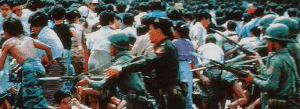STANFORD, CA - Although members of Congress from both major political parties have begun to call for the withdrawal of troops from Iraq, anti-war demonstrations, which were common at Stanford University in 2003, have yet to be seen on campus this year, according to the Stanford Daily.
Senior Tanya Haj-Hassan, president of the Coalition for Justice in the Middle East, attributed the lack of demonstrations to a change in student mentality. "Three years ago, before the war started, people were very active and outspoken to prevent the war," she told the newspaper. "Once it started, many people began to change. Some people lost hope while others feared that taking an anti-war stance would be seen as an attack on, or lack of support for, the American troops fighting in Iraq.
"Many who had initially taken an anti-war stance and who are still against the war fear that withdrawing the troops at this point in time may increase the instability that the war created and only worsen the situation," she said.
At least 30 Stanford students were arrested during protests in March 2003. Less than 12 hours after President George W. Bush announced the first strikes against Iraq, Stanford students and faculty members joined a large, coordinated protest in San Francisco, blocking traffic at busy intersections by forming human chains.
Haj-Hassen argued that "people are still very interested in what is going on in the region," but are expressing their concern and discontent "through different means."
Junior Omar Shakir, president of the Muslim Student Awareness Network, agreed. "I think that student activism regarding Iraq has not really diminished but has assumed different forms over the last couple of years," he said. "I still think that Iraq is an issue of significant focus on campus, as seen by the huge turnout to events on this issue and the large e-mail lists of interested people and organizations that deal with the Middle East."
He drew a distinction between present student activity and past protests. "Our group usually does not organize rallies or protests because we have found that students on campus are generally not receptive to that kind of approach," he said. "Awareness and advocacy are critical and ultimately more effective at Stanford."


